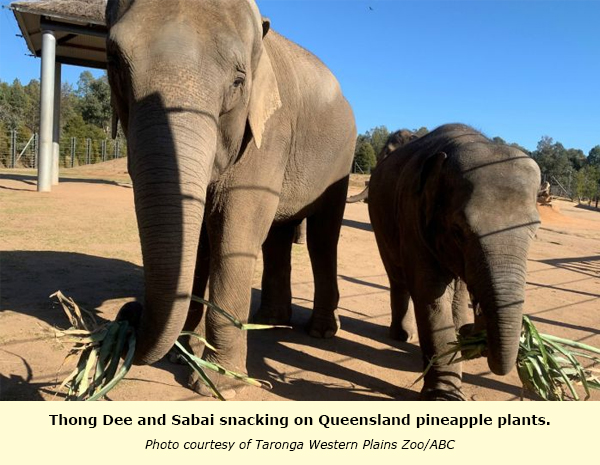Taronga’s Western Plains Zoo is trucking in pineapple plants from a farm 900 kilometres away to help feed its elephants as the drought bites hard in New South Wales.
The Dubbo-based attraction sourced the nutritious spiky plants from south-east Queensland’s Piñata Farms, which has been supplying them to its sister zoo in Sydney for the past decade.
“Up until this time, we’ve been able to not have to worry about shipping pineapple plants,” Western Plains zookeeper Bradd Johnston said.
Twenty-two-year-old Thong Dee — rescued from the streets of Bangkok where she was used to beg for money from tourists — tucked into the prickly delicacy with her second son, Sabai.
The Asian elephant was raised in a camp in Thailand where pineapple plants made up a large part of her diet.
“They range on a multitude of browse species in the wild and so we try to replicate that wherever possible; the roughage that these pineapple plants provide is very beneficial.”

Safe to eat
If you were worried that the elephants might hurt their mouths on the prickly plants, think again.
“They really love them. Elephants, whether they be Asian or African elephants, eat a lot of spiky plant material,” Mr Johnston said.
“They’ve got acacia trees over in Africa, which look almost like a cactus they have so many needles and spines, and they seem to chomp them down like a bowl of ice-cream — they don’t seem to bother them in the slightest.”
Piñata Farms managing director Gavin Scurr visited Sydney’s Taronga zoo to watch the elephants enjoy his pineapple plants and said they were valuable for more than just their nutritional value.
“From a behavioural perspective, the elephants pick them up in their trunks and smash them to the ground and pull them apart,” he said.
“It gives them the ability to forage like they would in the jungle rather than just eating hay.
“After harvest, we pull the plants out of the ground by the roots and put them in bins and send them on a truck down to them; what we’re packing today will be eaten by the elephants tomorrow.”
The whole plants provided for the elephants are a drop in the ocean for Piñata Farms, Australia’s largest pineapple producer.
It supplements south-east Queensland production with farms at Mareeba in far north Queensland and near Darwin in the Northern Territory to ensure a year-round supply of fresh fruit.
The business grows 6.5 million pineapple plants across 10 farms at Wamuran, where the first pines were planted by Gavin and Stephen Scurr’s father, Geoff, in the 1960s.
Source: Jennifer Nichols, ABC
